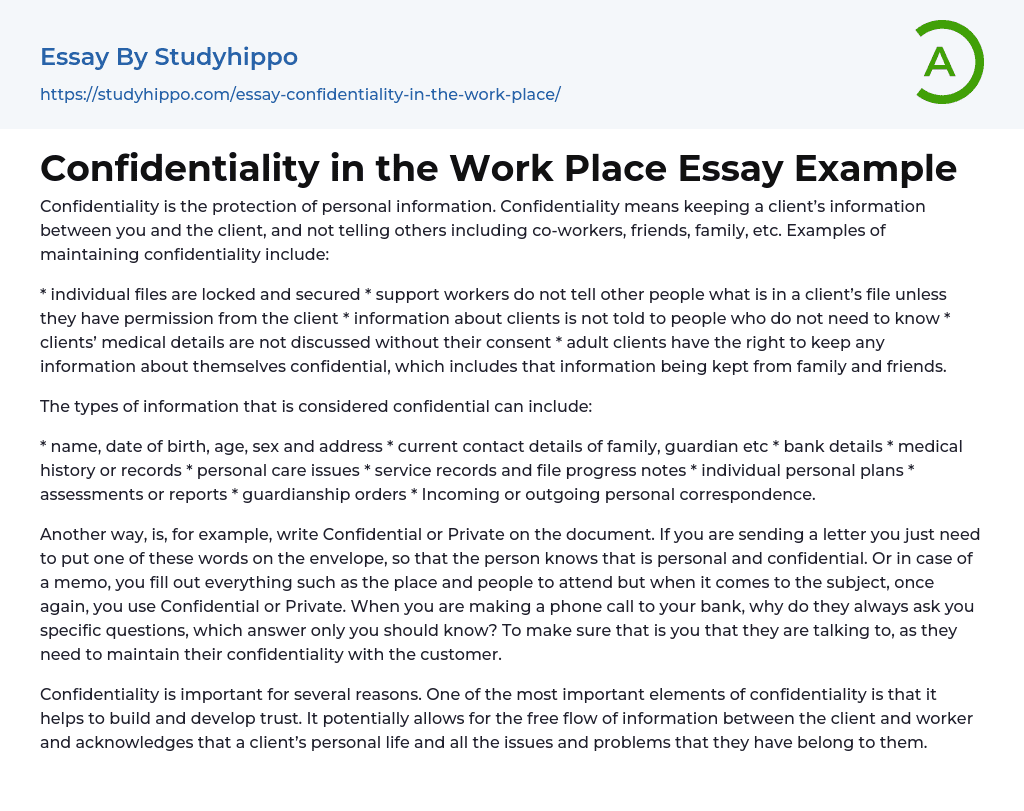Confidentiality is the protection of personal information. Confidentiality means keeping a client’s information between you and the client, and not telling others including co-workers, friends, family, etc. Examples of maintaining confidentiality include:
* individual files are locked and secured * support workers do not tell other people what is in a client’s file unless they have permission from the client * information about clients is not told to people who do not need to know * clients’ medical details are not discussed without their consent * adult clients have the right to keep any information about themselves confidential, which includes that information being kept from family and friends.
The types of information that is considered confidential can include:
align: justify">* name, date of birth, age, sex and address * current contact details of family, guardian etc * bank details * medical history or records * personal care issues * service records and file progress notes * individual personal plans * assessments or reports * guardianship orders * Incoming or outgoing personal correspondence.
Another way, is, for example, write Confidential or Private on the document. If you are sending a letter you just need to put one of these words on the envelope, so that the person knows that is personal and confidential. Or in case of a memo, you fill out everything such as the place and people to attend but when it comes to the subject, once again, you use Confidential or Private. When you are making a phone call to your bank, why do they always ask you specific questions, which answer only you should know? To make sure
that is you that they are talking to, as they need to maintain their confidentiality with the customer.
Confidentiality is important for several reasons. One of the most important elements of confidentiality is that it helps to build and develop trust. It potentially allows for the free flow of information between the client and worker and acknowledges that a client’s personal life and all the issues and problems that they have belong to them.
- Jurisprudence essays
- Social Injustice essays
- Juvenile Justice essays
- Agreement essays
- Business Law essays
- Common Law essays
- Community Policing essays
- Constitution essays
- Consumer Protection essays
- Contract essays
- Contract Law essays
- Copyright Infringement essays
- Court essays
- Crime essays
- Criminal Law essays
- Employment Law essays
- Family Law essays
- Injustice essays
- Judge essays
- Jury essays
- Justice essays
- Lawsuit essays
- Lawyer essays
- Marijuana Legalization essays
- Ownership essays
- Police essays
- Property essays
- Protection essays
- Security essays
- Tort Law essays
- Treaty essays
- United States Constitution essays
- War on Drugs essays
- Affirmative Action essays
- Assisted Suicide essays
- Capital Punishment essays
- Censorship essays
- Child Labour essays
- Child Protection essays
- Civil Rights essays
- Corporal Punishment essays
- Death Penalty essays
- Empowerment essays
- Euthanasia essays
- Gay Marriage essays
- Gun Control essays
- Human Trafficking essays
- Police Brutality essays
- Privacy essays
- Sex Trafficking essays




